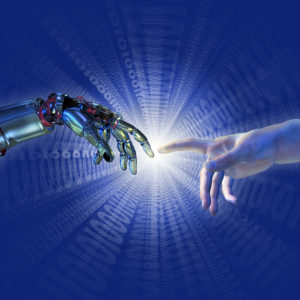In the 2013 film, “Gravity,” a chain reaction in space destroys countless near-earth satellites. Mission control warns an orbiting space shuttle that communications will soon fail. Amid a spacewalk, commander Matt Kowalski (George Clooney) mutters, “Half of North America just lost their Facebook.” Thus, a man pushing the frontiers of existence mocks one of today’s most sedentary activities.
On October 4, the whole world lost its Facebook (plus Instagram, Messenger, WhatsApp, Mapillary, and Oculus) for roughly six hours. Someone suggested that frustrated folks use the downtime to read a 25-page, 1909 short story, “The Machine Stops,” by E. M. Forster—a work alarmingly prescient about the world of 2021.
“The Machine Stops” describes a dystopia of lockdown, videoconferencing, Zoom-like lectures, streaming music, telemedicine, and memes masquerading as ideas. Humanity, living underground, rejects personal contact and physical experience in favor of isolated, online blather. Again, Forster wrote this 112 years ago.
In his book, “The Complacent Class,” our colleague Tyler Cowen observed that at one time, new technologies enabled ordinary people to travel and experience people and places around the globe, whereas contemporary technologies enable us to avoid travel and human contact. Instead, we cower in climate-controlled bubbles.
Earlier innovators invented steamships, trains, automobiles, zeppelins, airplanes, and rockets. They imagined ordinary people traveling in space. More recently—especially during the pandemic—technologists have constructed ways to avoid physical contact with others. Rather than build better transportation, we create virtual reality, pretending to visit other worlds rather than actually doing so.
Forster’s subterranean masses despise the very ideas of travel, physical experience, and human contact, preferring their sterile, solitary chambers and communication via glowing screens. They are equally disgusted by the idea that someone else might desire a more robust, inquisitive life.
We’re not yet at the degenerate stage of Forster’s characters, but their mindset swirls about us. During the pandemic, Richard Branson’s Virgin Media brought the internet to British customers. Jeff Bezos’ Amazon brought comforts and necessities to those huddled in solitude, and PayPal, co-founded by Elon Musk, helped pay for deliveries. Branson, Bezos, and Musk, having facilitated the sedentary life for others, harnessed their earnings toward their shared passion for spaceflight. Like Forster’s hermits, the passive and stationary assembled on social media to hurl opprobrium at “billionaire rocketeers” whose billions would presumably have been better spent by those living in virtual reality.
These trends have been in evidence for a while but were greatly accelerated by the pandemic and its resultant isolation. We’re both vaccinated practitioners of reasonable caution and social distancing, but we note that the authoritarian promise of absolute safety at the expense of all else is an age-old theme of literature and history, and rarely turns out well.
Buddha’s father tried shielding him from the awareness of suffering that was necessary for his enlightenment. In Edgar Allan Poe’s “The Masque of the Red Death,” Prince Prospero seeks to party in isolation with his friends through an epidemic. In medieval times, China was a great seafaring and trading power—perhaps the mightiest economic power on earth—until the Ming and Qing dynasties developed an ideology not unlike that of the Twitter users hurling virtual spitballs at Branson, Bezos, and Musk. Their self-imposed isolation yielded half a millennium of impoverishment from which China still struggles to emerge.
Paradoxically, some risks and physical discomfort are crucial to the quality of life. There is something dehumanizing about being comfortable at all times—at the same temperature, under the same light, with the same lack of physical exertion. Those of us who were campers long ago still recall fondly the chill of the morning, the heat of day, and the absence of light switches. The irritation of buzzing mosquitoes was a small price to pay for the music of crickets and frogs in the night. Similarly, any irritation with the risks and inconveniences of far-flung travel only added to our appreciation of the joy of mingling with people in developing countries around the world.
True happiness doesn’t appear to be achievable without some risk and discomfort. Perhaps if we were all a little more tolerant of our own minor discomforts, we might similarly be more tolerant of opposing ideas, and of fellow humans who choose to live differently than we do.


